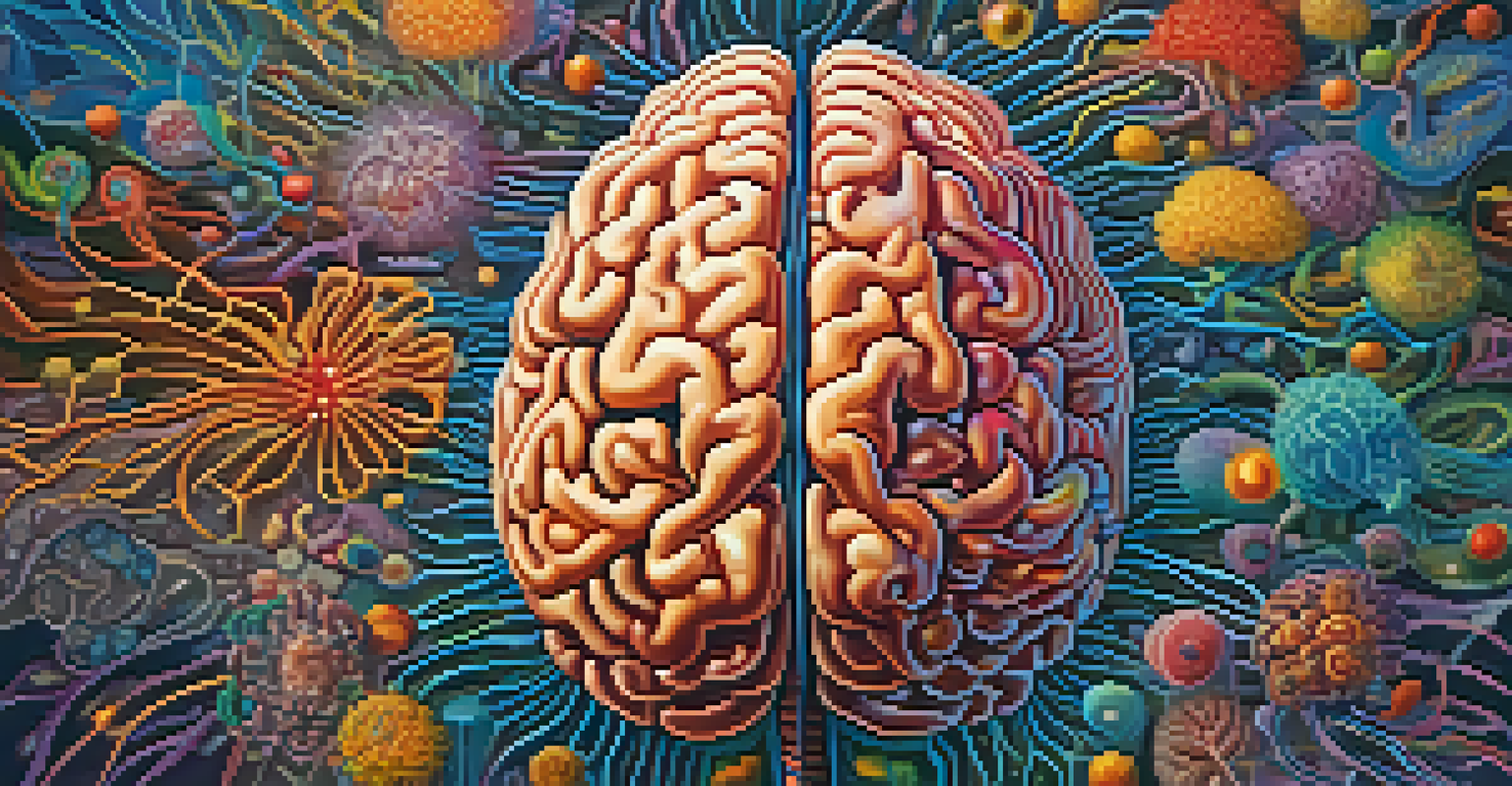The Science Behind Entheogens: Memory Enhancement Effects

Understanding Entheogens: What Are They?
Entheogens are substances, often derived from plants, that are traditionally used in spiritual or shamanic practices. They are known to induce altered states of consciousness, which can lead to profound experiences. Common examples include psilocybin mushrooms and ayahuasca, both of which have been used for centuries in various cultures.
The mind is like a parachute. It doesn’t work if it is not open.
These substances primarily affect the brain's pathways by interacting with neurotransmitters, particularly serotonin. This interaction can lead to changes in perception, mood, and even cognition. In recent years, researchers have begun to explore the potential therapeutic benefits of these substances, particularly in areas like memory enhancement.
As the stigma around entheogens begins to fade, more studies are emerging to understand their impact on mental health. This growing interest highlights the need to examine how these substances could be harnessed to improve cognitive functions, including memory.
The Brain's Memory System: A Quick Overview
Memory is a complex process that involves encoding, storing, and retrieving information. The brain regions primarily responsible for these functions include the hippocampus and the prefrontal cortex. Understanding how these areas work can help us appreciate how entheogens might influence memory.

The hippocampus plays a crucial role in forming new memories, while the prefrontal cortex is involved in decision-making and working memory. When entheogens are introduced into the mix, they may alter the usual workings of these areas, potentially enhancing our ability to remember and process information.
Neurotransmitters' Role in Memory
Interactions with neurotransmitters like serotonin can lead to improved cognitive functions.
Recent studies suggest that entheogens may promote neurogenesis—the creation of new neurons—particularly in the hippocampus. This could lead to improved memory retention and recall, making entheogens an intriguing topic for further exploration in cognitive enhancement.
How Entheogens May Enhance Memory Function
Research indicates that entheogens may enhance memory function by promoting synaptic plasticity, which is the brain's ability to strengthen or weaken synapses. This flexibility is crucial for learning and memory. By fostering a more adaptable brain environment, entheogens could potentially improve our memory capabilities.
We are not human beings having a spiritual experience; we are spiritual beings having a human experience.
Additionally, the experience of using entheogens often leads to introspection and emotional processing, which can create lasting changes in how we remember events. When we process emotions deeply, we're able to form more robust memories tied to those feelings, leading to better recall.
Moreover, the altered states induced by entheogens can lead to a more profound understanding of oneself and the world. This enhanced perspective may allow individuals to make connections that they wouldn't typically recognize, further enriching their memory and cognitive functions.
The Role of Neurotransmitters in Memory Enhancement
Neurotransmitters are chemical messengers in the brain that play a significant role in conveying signals between neurons. Serotonin, dopamine, and glutamate are particularly relevant when discussing memory and cognition. Entheogens often interact with these neurotransmitters, creating shifts in mood and perception that can influence memory.
For example, psilocybin, the active compound in magic mushrooms, primarily affects serotonin receptors. This interaction can result in altered states of consciousness, potentially leading to enhanced memory encoding and retrieval processes. By modifying the brain's chemical landscape, entheogens may promote improved cognitive function.
Entheogens and Memory Enhancement
Entheogens may enhance memory by promoting synaptic plasticity and emotional processing.
Understanding the intricate dance between neurotransmitters and memory is key to comprehending how entheogens can play a role in enhancing our cognitive abilities. Ongoing research aims to uncover the exact mechanisms and long-term effects these substances may have on memory.
Current Research on Entheogens and Memory Enhancement
Current studies are exploring the memory-enhancing effects of various entheogens, with promising results. For instance, researchers have found that psilocybin can improve cognitive flexibility, which is essential for effective problem-solving and memory retention. These findings suggest that entheogens could have significant applications in cognitive therapy.
Another area of interest is the potential of ayahuasca in treating PTSD and other memory-related disorders. The unique combination of DMT and MAOIs in ayahuasca may promote emotional healing, leading to clearer memory recollection and processing. This could revolutionize how we approach mental health treatment.
As research progresses, it's crucial to consider not just the benefits, but also the risks associated with entheogen use. A balanced understanding of their effects on memory will inform safe practices and therapeutic applications in the future.
Cultural Perspectives on Entheogens and Memory
Throughout history, many cultures have used entheogens for spiritual and medicinal purposes, often linked to memory and learning. Indigenous tribes, for instance, have employed these substances in rituals to enhance memory and connect individuals with their ancestors. This cultural context offers valuable insights into the potential cognitive benefits of entheogens.
In modern times, there's a growing movement to re-examine these traditional practices and integrate them into contemporary therapeutic settings. As more people share their experiences with entheogens, a collective narrative emerges that underscores their potential role in enhancing memory and emotional well-being.
Cultural Insights on Entheogens
Many cultures have historically used entheogens for spiritual and medicinal purposes linked to memory.
By respecting and learning from these cultural perspectives, we can better understand how entheogens may serve not just as tools for memory enhancement, but also as pathways to holistic healing and personal growth.
Future Directions: Entheogens in Cognitive Therapy
The future of entheogens in cognitive therapy looks promising, particularly in enhancing memory-related disorders. As research continues to unveil the cognitive benefits of these substances, we may see them integrated into therapeutic practices for issues such as depression, anxiety, and PTSD. Their unique ability to alter perception and emotional states could lead to breakthroughs in memory treatment.
Moreover, the potential for personalized medicine could play a significant role. By tailoring entheogen-assisted therapies to individual needs, practitioners may enhance the efficacy of memory treatments. This personalized approach could usher in a new era of mental health care that focuses on the whole person.

Ultimately, the integration of entheogens into cognitive therapy will require a careful balance of scientific research, cultural respect, and ethical considerations. As we move forward, the exploration of these substances may not just enhance memory, but also foster deeper connections to ourselves and our shared humanity.